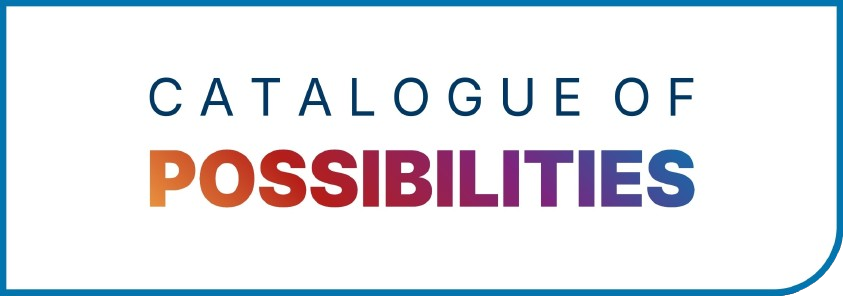Catalogue of Possibilities / MPAs
Problem-Based Interdisciplinary Research
Click / tap the stars next to items in the CoP to mark your favourites.
Problem-based research embraces interdisciplinarity to develop new ideas and solve pressing challenges in the world today. A key goal, obstacle or outcome is identified by a ‘stakeholder’ and a team is assembled to tackle this and deliver real change in a short space of time.
Such challenges are typified by their multifaceted and complex nature, so by bringing research teams together from disparate domains to focus on a common goal, expertise and experiences gained through discovery-driven research can be combined to rapidly generate a solution. Such an interdisciplinary approach fosters creativity and encourages out-of-the-box thinking, leading to innovative solutions that may not have been possible within the confines of a single discipline, and ‘impact’ far beyond the researcher’s normal sphere of influence.
Complimenting this approach, discovery driven research aims to develop new hypotheses based on open ended experiments and data gathering, observing the world around us to analyse patterns and trends, and lay the groundwork for future experimentation. This is often done by individuals or small teams, expert in their discipline, undertaking curiosity driven work to push the boundaries of knowledge.
However, this challenge-led approach is not without its own difficulties. Challenges may not be well defined or may evolve over the course of the project, requiring adaptability and having a high degree of ‘risk’. Speaking the same ‘language’ across different disciplines can be difficult, and requires each party to gain some understanding of the others, to make best use of the tools and knowledge available. In this setting a researcher who is keen to speak the ‘multiple languages’ and tackle problems in a flexible way whilst drawing on their own fundamental expertise will be able to bring teams together. By keeping an eye out for curious results or trends during the project they can make huge real-world impact in a short space of time, as well as drive discovery in their own and other disciplines.
The University of Glasgow strongly promotes an open and collaborative research ethos, which has led to formation of numerous interdisciplinary projects and initiatives across the seven Schools of the College of Science and Engineering; diverse examples include combining spectroscopy with AI to determine the age of malaria carrying mosquitos, and using statistical modelling methods developed for gravitational waves to analyse the Antikythera mechanism. This approach has led to international recognition of the long-lasting and wide-ranging impact of our world leading research.
Supervisors working in this field
Dr Ali Gooya
Senior Lecturer in Machine Learning
Prof Ana Garcia Lecuona
Professor of Mathematics
Dr Andrew Feeney
Senior Lecturer in Mechanical Engineering
Professor Andrew Sutherland
Professor
Dr Antoniette Greta Grima
Lecturer/assistant professor in Computational Geoscience
Dr Arash Azizi
Lecturer in Geotechnics for Sustainability and Resilience of Infrastructure
Dr Blair Archibald
Lecturer in Computing Science
Dr Burak Kizilkaya
Lecturer in Computer Networking
Dr Carlos Garcia Nunez
Lecturer in Electronics and Nanoscale Engineering
Dr Carlos Domingo-Félez
Lecturer
Professor Caroline Gauchotte-Lindsay
Professor of Environmental Engineering and Chemistry
Dr Caroline Muellenbroich
Senior Lecturer
Dr Chee Kiat Seow
Associate Professor of School of Computing Science
Dr Craig Anderson
Senior Lecturer in Statistics
Professor Daniele Faccio
Professor in Quantum Technologies
Prof Dave Adams
Professor of Materials Chemistry
Dr Debasis Ganguly
Lecturer in Data Science
Dr Divya M Persaud
Research Fellow
Prof Douglas Paul
Royal Academy of Engineering Chair in Emerging Technologies
Dr Andrew (Drew) Thomson
Lecturer in Chemical Biology
Prof Duncan Gregory
Professor of Inorganic Materials
Dr Edmond S. L Ho
Senior Lecturer in Machine Learning
Dr Emma Gibson
Senior Lecturer
Dr Gerardo Aragon Camarasa
Senior Lecturer of Robotics and AI
Dr Giorgos Georgiou
Senior Lecturer
Dr Handan Gul Calikli
Senior Lecturer in Software Engineering
Dr Haotian Chen
Lecturer
Prof Hui Yu
Professor of Visual and Cognitive Computing
Dr Ian MacLaren
Reader in Physics
Dr Iraklis Klampanos
Senior Lecturer of Data Systems and Data Engineering
Prof Jethro Browell
Professor of Statistics and Data Analytics
Prof Joemon Jose
Professor
Dr John MacDonald
Senior Lecturer in Anthropogenic Geomaterials
Dr Julien Le Kernec
Senior Lecturer
Dr Jun Young Cheong
Reader in Materials for Green Energy Technologies (Systems Power & Energy)
Dr Karen Cameron
Senior Lecturer
Dr Kayla Fallon
Research Scientist
Dr Laura Hepburn
Manager, NERC-NEIF Stable Isotope Geoscience Laboratory / Research Scientist
Dr Lucas Ferrari Gerez
Lecturer in Biomedical Engineering
Dr Luiz Felipe Aguinsky
Lecturer
Dr Maggie Creed
Lecturer in Water Engineering
Dr Mahmoud Wagih
Lecturer and UK IC Research Fellow
Dr Mary Ellen Foster
Senior Lecturer in Human-Robot Interaction
Prof Matthew Chalmers
Professor of Computer Science
Prof Mohamed Khamis
Professor of Human-Computer Interaction
Dr Mohammad Yazdani-Asrami
Lecturer in Electrically Powered Aircraft & Operations
Dr Nazila Fough
Senior Lecturer
Dr Oana Andrei
Senior Lecturer
Dr Ornela Dardha
Senior Lecturer
Dr Paul Henderson
Lecturer in Machine Learning
Dr Peggy Gregory
Senior Lecturer Software Engineering
Dr Qusay Raghib Ali Al-Taai
Research Associate
Prof Rachael Jack
Professor of Computational Social Cognition
Prof Richard C. Hartley
Professor of Chemical Biology
Dr Richard Bowman
URF & Reader in Optics
Professor Ross Forgan
Professor of Supramolecular and Materials Chemistry
Dr Sam Bayliss
Lecturer in Quantum Engineering
Dr Swayamdipta Bhaduri
Assistant Professor of Mechanical Engineering
Dr Tanaya Guha
Senior Lecturer of Computing Science
Umer Zeeshan Ijaz
Reader in Information Engineering
Professor Vihar Petkov Georgiev
Professor of Nanoelectronics
Dr William Peveler
Lecturer
Dr Wrik Mallik
Lecturer in Aerospace Engineering
Dr Yehia Elkhatib
Reader

